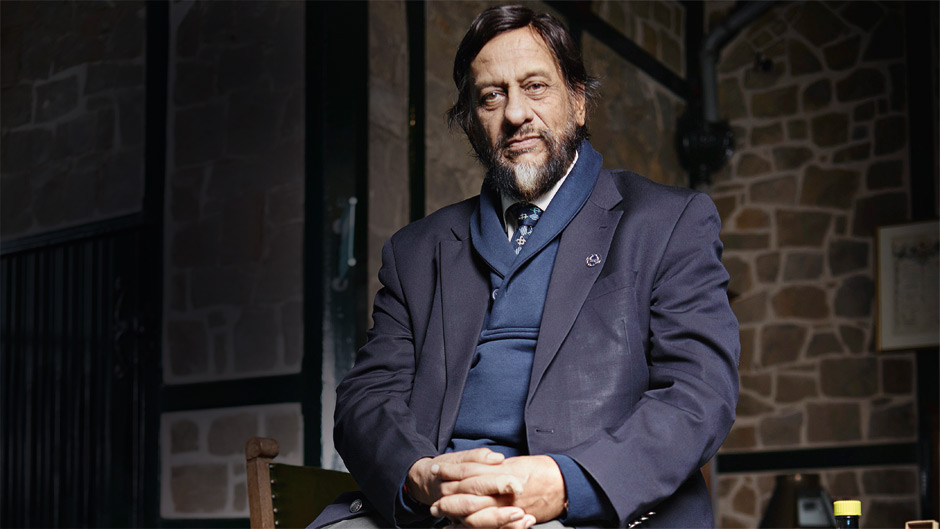Rajendra Pachauri: “It is pure science, not faith”
The chairman of the IPCC, a UN body that monitors climate change, says that the aim is not to guess the future but to understand trends and make the right forecasts

Rajendra Pachauri a 73-year-old Indian engineer and economist, is a tireless promoter of the fight against global warming. He is chairman of the Intergovernmental Panel on Climate Change (IPCC), a UN body that won the Nobel Peace Prize in 2007. However, in recent years he has had to face a lack of confidence after two controversial scandals: in 2007, crass errors were pointed out in a report which the IPCC publishes every six years containing data on the state of the world´s climate; in 2009, e-mails were leaked that suggested figures had been manipulated in documents. This stumbling block became popularly known as “Climategate”. Pachauri announced a new study published by the IPCC last week which points to real effects of global warming which are already seen in a number of regions of the world, such as long periods of drought, unusual flooding and the melting of glaciers. A new aspect of the text was the care and special effort taken in the data collection to avoid the errors of 2007. In this edited version of an exclusive interview that appears in Portuguese in the current issue of VEJA, made by telephone from his office in New Delhi, Rajendra Pachauri answered the toughest questions with a mixture of irritation and irony but without losing his composure for a single moment.
If climate science cannot even forecast whether it will rain next weekend, how can it be sure of the Earth´s climate in 100 years’ time?
There is an enormous gulf between these two kinds of analysis. A number of factors strongly affect the climate from one day to the next. (One example is air currents that may behave in a totally unpredictable way.) In the case of climate changes, we consider a much greater combination of data which is less subject to unexpected divergences. We mainly take into account the increase in the concentration of greenhouse gases in the atmosphere. We know that this concentration is currently 40% higher than it was at the beginning of industrialization in the 18th century. When we compare these historic figures, decade against decade, with the climate changes registered, we end up with two curves that reveal a great deal when superimposed. They show the trend of the increase in the global temperature in the same rate as the concentration of greenhouse gases expands. This is not guess work. We carry out strong scientific work, which uses complex mathematical models processed by supercomputers. The results are checked by hundreds of researchers. That is why the comparison with the weather forecast for the weekend is not appropriate. The knowledge we produce is aimed at making projection for long periods. Climatology might be better compared to the stock market. It is impossible to determine exactly the correct value of a particular share tomorrow but examining the trends opens the way to more precise long-term forecasts.
How does this new IPCC report explains the gap in global warming that occurred over the last 16 years, when the average global temperature grew by only 0.04 of one degree by decade compared with the forecast of 0.21?
The critics have interpreted this figure wrongly. They ignored the fact that the starting point for the analysis of this period, 1998, was an unusually warm year. This initial starting point of a very high temperature contaminated the whole series, as the cooling that followed was interpreted as a gap.
Should the warming not have been progressive according to your models?
The World Meteorological Organization has just published its annual report in which it stresses that the year 2013 matched 2007 as the sixth hottest since the series began in 1850. Although temperatures vary naturally in such a way that one year may be followed by another that is less hot, this does not alter the general warming trend. Thirteen of the 14 hottest years since measurements started being made have occurred at the beginning of this century. The decade of 2001 to 2010 was the hottest ever registered. The gap, the supposed pause in warming, only appears when you start from 1998, that abnormally warm year. When you analyze the heating curve over a longer period, of decades, the gap is no longer statistically important.
Many researchers say that climate change is moving from a science to a belief. An example of this is that those who are not aligned with the IPCC´s conclusions are called skeptics…
Our work is pure science and not faith. We write to all the member states of the UN asking them to recommend serious scientists. We chose 831 researchers of the highest caliber to work with us on the current report. We do not differentiate between those who believe or do not believe in global warming. We base the report on the history of publications related to the issue. The scientists, representatives of the best universities, are not like sheep that can be manipulated. Not in the slightest. This story of skeptics and non-skeptics is nonsense. We only deal with scientific data.
Did the IPCC scientists take into consideration the reduction in the rate of warming in the new projections?
Of course. We know there are years when lower temperatures are registered while others have higher temperatures. We analyze the global trend with this data.
Do you see any merit in the theories that remove industrial civilization from the equation and point to global warming as a result of the Earth´s natural cycle?
Climatic registers that we can really call scientific began being made in 1850. There were no reliable measurements before then. When we make forecasting models, we also consider the natural variables, such as solar activity peaks. However, what we note is that the global warming that has been measured cannot be explained by natural causes alone. When we introduce the data for greenhouse gas emissions produced by civilization, the equation makes sense. The calculation show how much of the warming is caused by man. Our latest conclusion is that it is 95% certain that the abnormal warming that has been occurring since the middle of the 20th century is a result of the action of our civilization.
How do you deal with facts — such as the increase in the extension of the sea ice in Antarctica — that strongly contradicts the idea of global warming?
Extreme precipitation events are increasing which means that heavy rainfall and blizzards will occur more often. These extremes explain the increase in the extension of the frozen sea. However, it should be understood that the annual fluctuations do not affect the climate changes that point to a reduction in the frozen sea in the long term. Let us put aside the anomaly of the Antarctica and check the situation in the Artic. The reduction in the quantity of ice in the north polar cap is highly relevant and undeniable.
Is foreseeing tragic effects from this warming process not just another sign of the human obsession with the apocalypse?
Not in the slightest. Climate changes impact the whole planet. I can list the heat waves, the cases of extreme precipitation and the rise in the sea level by 19 centimeters over the last century. The negative impacts of the prolonged droughts on agriculture and stocks of drinking water cannot be downplayed. You do not need to believe, just look. You cannot look away from the real situation. The apocalypse is instantaneous destruction. What we are seeing is a gradual deterioration.
The previous IPCC report from 2007 was damaged by the leakage of e-mails between scientists, indicating the manipulation of figures, and also by the discovery that there had been a mistake in the forecast of the melting of the Himalayan glaciers. How has the IPCC´s credibility survived?
Firstly, I want to make the point that, despite everything that was said to the contrary after the revelation of those messages, the glaciers are actually melting around the world. What happened was that we had two wrong statements on the melting rate in the Himalayas in a report of 1,000 pages. Nevertheless, there is no doubt that the glaciers are still being hit by the melting of the ice.
But was the data manipulated?
As for the e-mails that were obtained illegally, five committees investigated and concluded that the scientists did nothing wrong. You can send an e-mail between friends saying “I am going to kill so and so” but it only means you are very annoyed with somebody.
But it was said in the report that the glaciers in the Himalayas would melt away completely by 2035. By coincidence, soon after the e-mails were leaked, it was revealed that the scientists appeared to have arranged to manipulate the data.
I repeat: it was a small error in a report of 1,000 pages. We admit those mistakes and implemented measures to avoid repeating them.
Did the content of the messages exchanged show or not show that the data had been manipulated?
There was no manipulation. It was only a mistake. Do you know how the IPCC operates?
Generally speaking, yes…
Studies are revised by specialists and their comments are taped. Whether the comment is accepted or not, it must be taken into consideration. All those involved are scientists with an excellent reputation. We take great care to ensure there will be no errors in the texts but it is worth recalling that this is a human job. Nobody is perfect. Nobody is God. We can all make mistakes. The important thing is that our conclusions are solid and we are prepared to defend them. Even in the case of the glaciers, the data is clear: they are melting everywhere.
What measures were taken in the new report to avoid mistakes?
We began to be much more careful. We value the research made by reputable bodies such as the World Bank or published in well-known magazines.
A study published last year showed that 114 out of 117 climate forecasts made in the 1990s were wrong. How do you explain this result?
I do not know these documents or the authors.
What is more efficient in slowing down global warming: the development of cleaner technologies or a change in behavior?
A combination of the two. The Netherlands had to increase the height of the dikes to prevent the sea invading, due to the gradual increase in the level of the oceans. The impacts on agriculture mean we will have to grow plants that are less affected by climate changes. We will also have to use energy sources that release less carbon. At the same time, the choice of using more public transport can help reduce CO2 emissions.
What measures can Brazil take to offset the effects of global warming?
It is extremely important to protect the Amazon and the other forests. However, greenhouse gas emissions need to be reduced. Brazil did well in betting on the ethanol program and using lots of hydroelectric energy but it could also adopt other forms of renewable energy.
You come to the end of your second mandate as IPCC chairman this year and could have been elected again. Why did you decide not to stand?
I have been leading the IPCC since 2002. That is long enough. I am going to dedicate myself to my climate research institution and position as resident professor in a number of universities, including Yale and Columbia.
Is your departure related to the controversy around the 2007 report?
If that been the case, I would have gone five years ago. When I believe in something, I defend it. I do not run away.


 SEGUIR
SEGUIR
 SEGUINDO
SEGUINDO

 Premiê ucraniano diz que haverá Terceira Guerra Mundial se Rússia vencer
Premiê ucraniano diz que haverá Terceira Guerra Mundial se Rússia vencer A mais longa das noites: países árabes cooperaram com Israel contra Irã
A mais longa das noites: países árabes cooperaram com Israel contra Irã O curioso elogio a Wagner Moura em ‘Guerra Civil’, segundo americanos
O curioso elogio a Wagner Moura em ‘Guerra Civil’, segundo americanos Filho de Renata Lo Prete diz como se inspira nos horários notívagos da mãe
Filho de Renata Lo Prete diz como se inspira nos horários notívagos da mãe Pesquisa revela o tamanho do prejuízo em bares e restaurantes no RJ
Pesquisa revela o tamanho do prejuízo em bares e restaurantes no RJ







